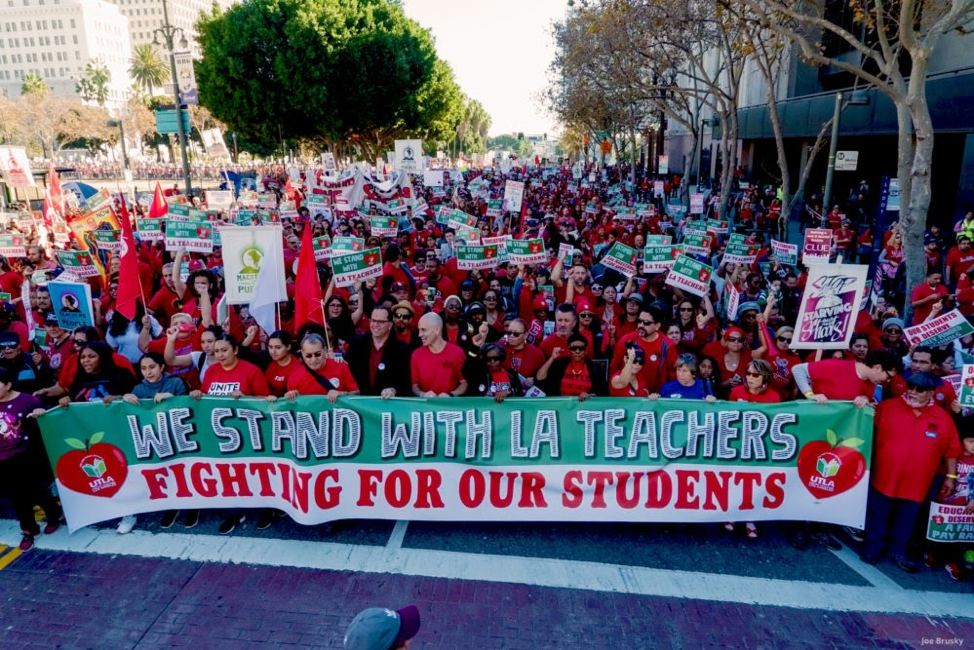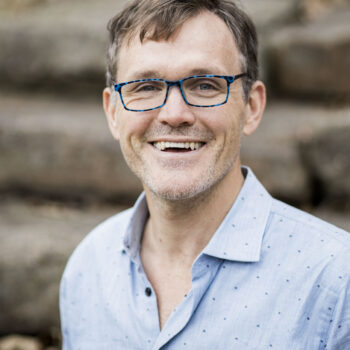Webinar: Lessons from the LA Teachers Common Good Campaign and Strike Victory
A conversation with United Teachers of Los Angeles (UTLA) President Alex Caputo-Pearl, Amy Schur of the Alliance of Californians for Community Engagement (ACCE), Rudy Gonzalves of the Los Angeles Alliance for a New Economy (LAANE), and other community leaders and parents about the strategies and lessons learned from Common Good strike in January 2019.
Excerpts from the webinar
What is the Bargaining for the Common Good (BCG) approach? Community and union members partnering around a long-term vision for the structural changes they want to see in their communities and using union bargaining as a critical moment in a broader campaign to win that change.
Marilyn Sneiderman, Executive Director, Center for Innovation in Worker Organization (CIWO), Schools of Management and Labor Relations, Rutgers University: The focus of this webinar is on what has been done, the extraordinary work in Los Angeles. There is not a soul I would guess on this call who doesn’t know about and experience the serious attacks and challenges we face in our communities. And I have to say the LA teachers’’ strike is a clear example of how we can create the change we want to see. We need to be bold and organize in a strategic way. It is just wonderful to be with these great folks from LA who have inspired the nation. The educators, the parents, the students, racial justice groups, community organizers who’ve demonstrated that not only can we fight back but we can go on offense and win. That we can organize, we can bargain and we can strike for the common good. But I’ll tell you this isn’t easy. And I’m just grateful for the folks in LA to share both what they did and also what they learned, so we can all learn and take on these battles to build a better world together.
Amy Schur, Campaigns Director, Alliance of Californians for Community Empowerment (ACCE), Moderator: By way of introduction from the community side of this fight, probably a lot of you in this struggle are familiar with the chant now, “Whose schools? Our schools.” Well, here in LA, many parents and students on the picket line started adding to that, saying, “Whose strike? Our strike.” And I’ll tell you, that wasn’t on the chant sheets, and that came from here, from the heart, not just from the intellectual side of it. We own this campaign, we own this strike, because we helped develop it side by side with UTLA and the whole coalition Reclaim Our Schools LA (ROSLA). We do feel like something special has happened here. And through the course of the speakers you are going to be hearing some common themes about both the discipline of the work to engage teachers at a really deep level but also parents at a really deep level. And then you are going to hear about the vision and analysis and shared campaign plan that was developed over years.
Rudy Gonzalves, Campaign Director, Los Angeles Alliance for a New Economy (LAANE):
I want to talk about our coalition, Reclaim Our Schools LA (ROSLA) and the centrality of parents and students in our fight to save public education ….. ROSLA formed around 2016 with the leadership of UTLA, LAANE, ACCE and Students Deserve. Those orgs have been the anchor organizations of our coalition. We recognized then the need for a labor-community alliance focusing on a common vision, building trust, and it was really an effort to bring together organizations despite the fact that we had different structures, decision making processes, different capacities and even organizing approaches. But we all had a common bond in terms of our interest and passion to save our public schools. Those differences over time particularly with the common vision and work together have become our strength and our coalition has expanded since then.
ROSLA supported UTLA’s leadership with Bargaining for the Common Good demands, especially as it geared up for it’s contract fight. Reclaim Our Schools took the lead in creating space for parents and families to identify what their biggest concerns were and how they could be addressed. From those meetings, along with the union’s internal feedback loops, UTLA developed their bargaining proposals, which were very broad and far-reaching. Inspired by our brothers and sisters in St. Paul, MN and Chicago, UTLA invited members of ROSLA to join the first bargaining session with LAUSD to present demands in September 2017. That was a powerful moment. Several organizations presented a demand that was allied with their organizational purpose. For example, our regional powerhouse that focuses on immigrant rights presented on an immigrant legal defense fund, advocates for early child development did the same, Students Deserve presented on abolishing racially discriminatory random searches. All of these issues and solutions were rooted in the community.
Amy Schur: It is my pleasure to introduce Ruby, who was one of the parent leaders who was chanting the “Whose strike? Our Strike!” chant on the picket lines. So Ruby, if you could share a little bit about yourself and how and why you got involved?
Ruby Gordillo, LAUSD parent and member of ACCE: I’m 32 years old. I have three kids, all in LAUSD schools. I grew up in the San Gabriel Valley, it’s east of Los Angeles. Going to school in that area, we had all kinds of things. We had music and art, we had home ec, we had mechanics, we had field trips, we had what every school should have. So, as a mother and having my kids in LAUSD, I started realizing what about the field trips, what about this, what about that.
Let me skip a little bit into where I became familiar with organizing and Reclaim Our Schools. An ACCE came to my school and he talked to us about what was happening in the district, and what we were lacking. So, the investment in the schools, in our children. He told us about how there was a huge surplus. I have children in special ed classes. When I knew there was a surplus, I was in the fight for special ed students, for all students.
Before all of this I was really quiet, I never spoke up. Hearing all these injustices, it got me to really speak up and fight for our needs, and to teach our kids to fight for what they need and what they deserve.
I met all kinds of parents, teachers, students and community members who shared these ideas with me. And they each had their own reasons why they were joining the fight. All together they were like ingredients to this great soup – we are Reclaim Our Schools.
Amy Schur: One thing that we did that may have been fairly unique for this strike – as Reclaim Our Schools LA we did a week long action school during the first week of the strike which had a group of parents and teachers and students organizing all day, every day to find some innovative, somewhat edgy ways to support the strike and put on more pressure. Do you want to talk about that?
Ruby Gordillo: So during that strike, we were all busy. We were not in the LAUSD schools but we were all in school. We were learning all kinds of information on how the 1% basically has set us up for failure. How the school to prison pipeline and how, as a brown person, as a person of color, it got me to realize, it really woke me to reality. The larger the population in the schools of brown and blacks, the less investment there is. Why should we settle for that? We’re not less. We’re equal. That is a big part of how empowering this is. Because it’s parents and students and teachers and community members all fighting together, all learning together, all planning together.
We did direct actions. We visited the home of the president, Monica Garcia. In the pouring rain. That was amazing. It was a great experience.
Amy Schur: Why?
Ruby Gordillo: To see how the people were demanding for her to come out and face us. And it didn’t matter how soaking wet we were, you know. It was just, we wanted her to come out and she refused. She was scared.
Amy Schur: She sure knew we had been there.
Ruby Gordillo: Yes, for sure. She got the cops on us.
Amy Schur: In conclusion, Ruby, did you want to say anything about where it goes from here for you, for us as Reclaim Our Schools LA?
Ruby Gordillo: Well, I see a great future for ROSLA. Not because the strike is done and over with and we got a good contract, I’m not going to say we didn’t. But do we deserve more? Yes we do. Are we going to fight for more? Yes, we are. This is just the beginning of it. We are going to bring out more awareness and make our coalition much bigger and show them who is in charge and who this strike and who this fight is for. Itt is for our students, not the current students only but the students of the future. And we are going to show them that we got this.
For more, watch the webinar.

